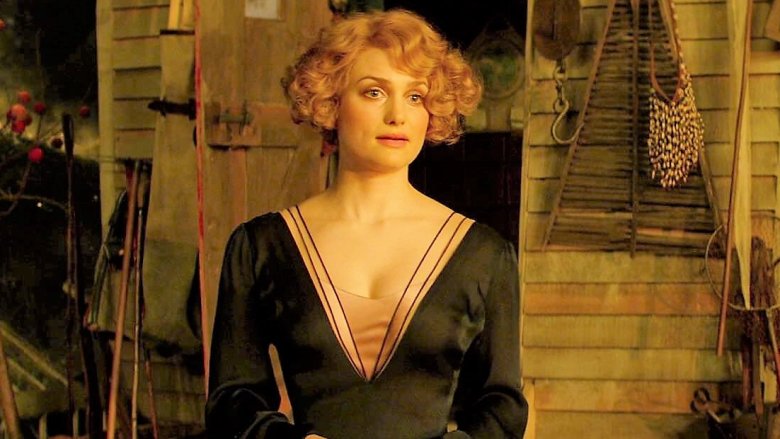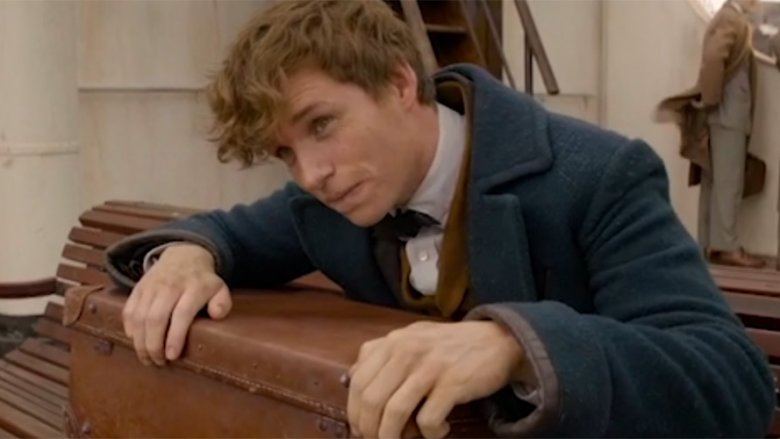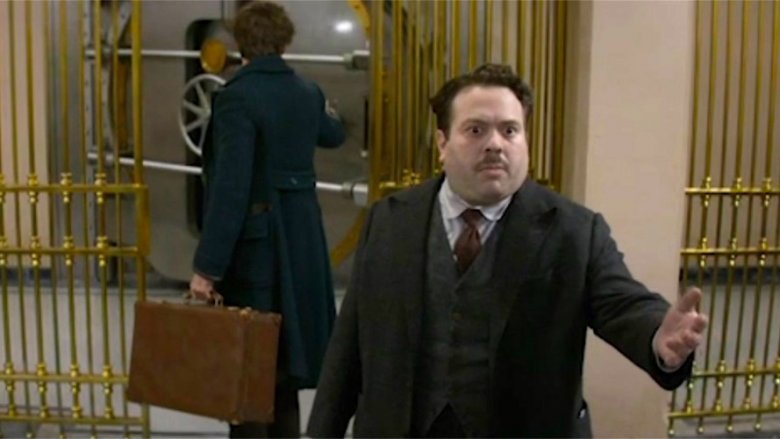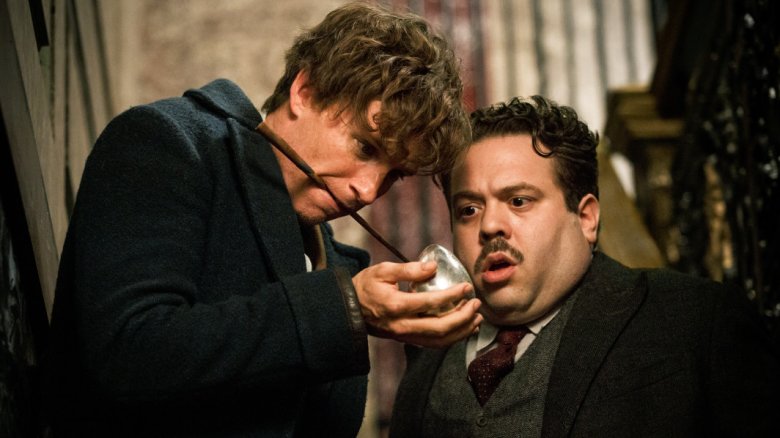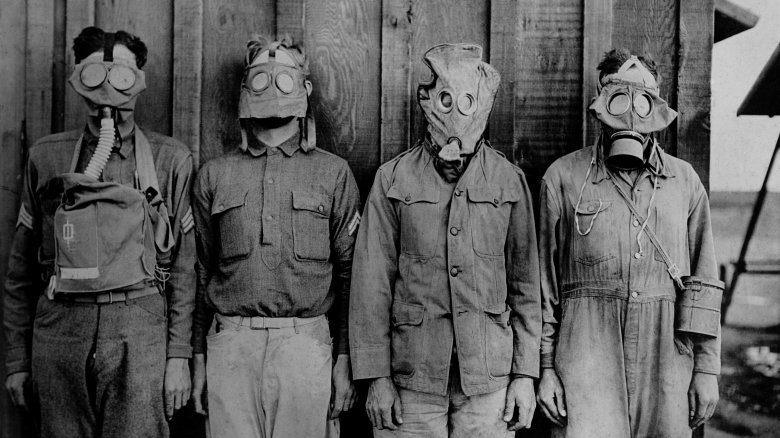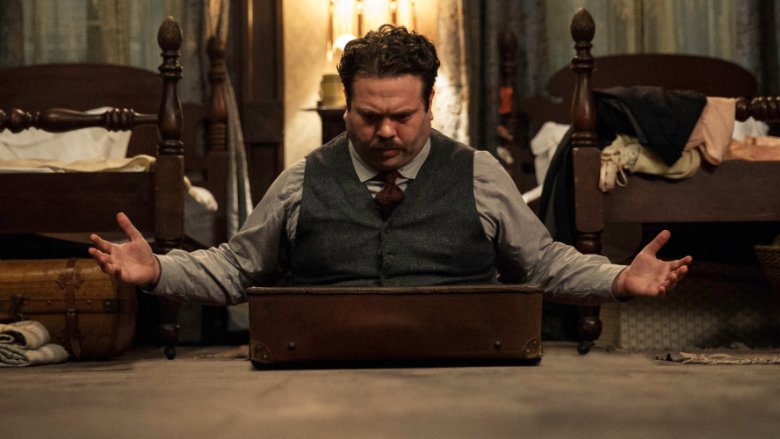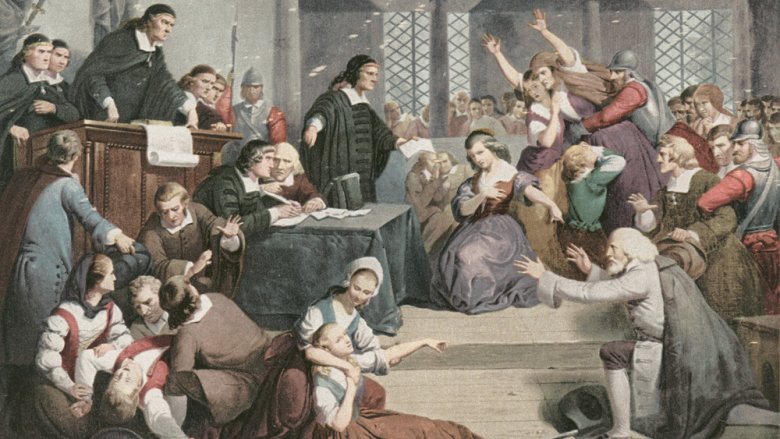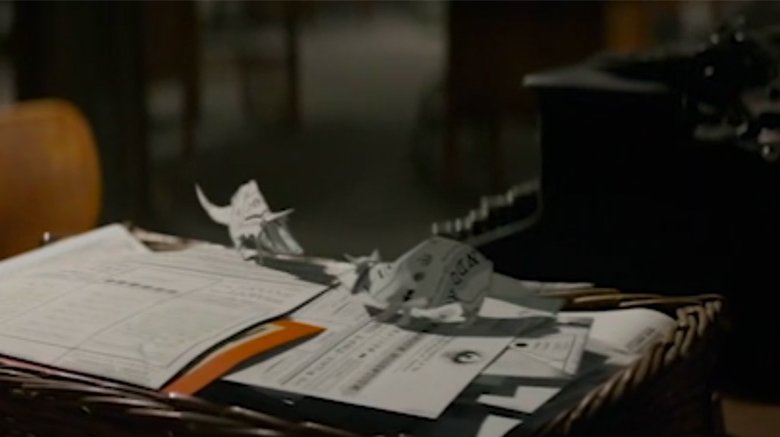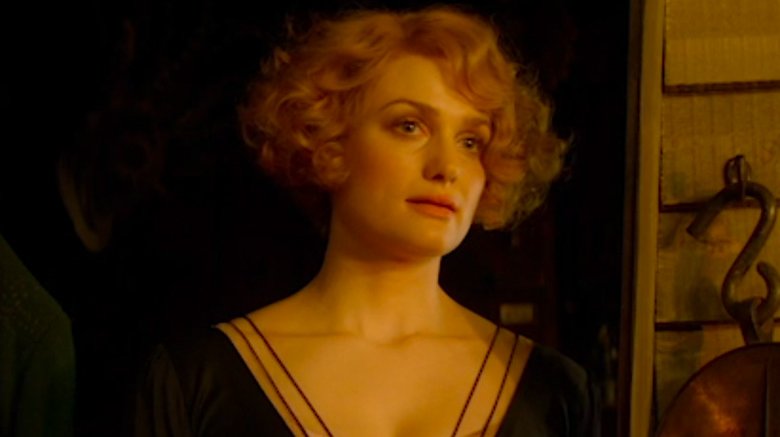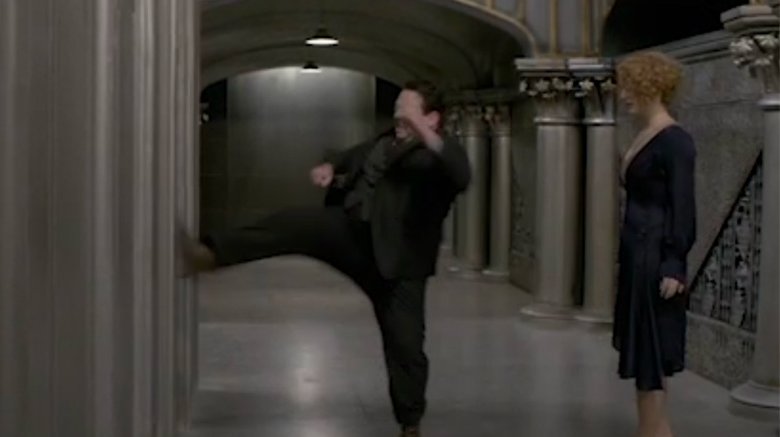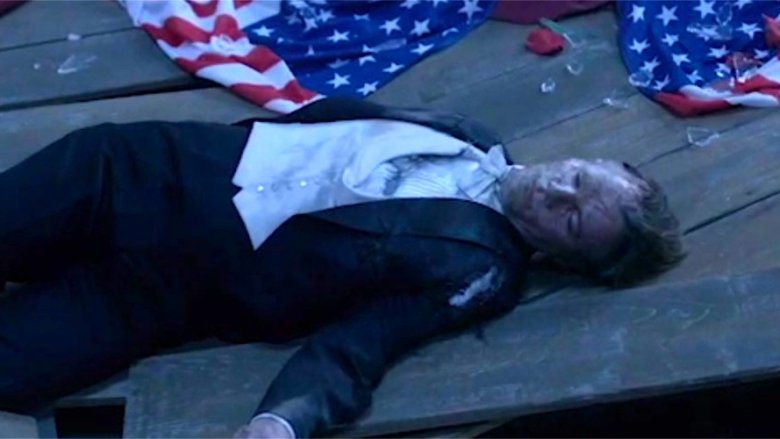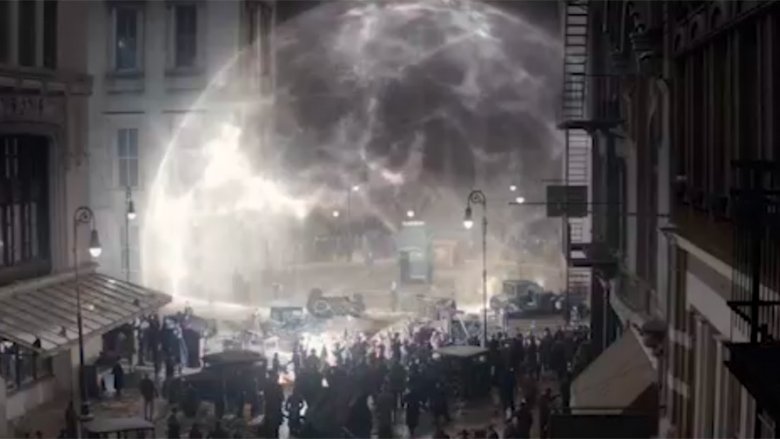Fantastic Beasts Details That Only Adults Notice
The Fantastic Beasts films represent a massive expansion of the Harry Potter universe, filling in the backstory of the Wizarding World in a way that fans have been craving since Harry's story finished in his seventh book. It's not just an in-depth look at one of Harry's textbooks, however — Newt Scamander, the Goldstein Sisters, and their non-magical pal Jacob Kowalsky have their own story of international intrigue that weaves through the lives of Albus Dumbledore, Lord Voldemort, and Hogwarts itself.
It probably goes without saying that the first film, Fantastic Beasts and Where to Find Them, is already a massive hit with the same kind of young audience that first latched onto the Harry Potter franchise, dazzling them with magical creatures. If you're watching them as an adult, though — whether you're tuning in with your own kids or just keeping up with the story you already love — there are a lot of things in that movie that raise a few questions. Here are the things you'll only notice in Fantastic Beasts if you watch it as an adult.
Coming to America
The film opens with Newt Scamander arriving in New York on a steam ship and going through customs, which is a great way to introduce the audience to our new main character and kick off a little bit of tension with his enchanted briefcase. The thing is, Newt's a wizard. It's kind of his whole deal, and in what we've seen from the wizarding world already, wizards don't usually enjoy hanging around with Muggles for three weeks while their ships chug across the Atlantic Ocean.
We're not saying Newt should've ridden a broom to a different hemisphere, and there's a mention in the books the Floo Powder network requires some kind of connections that probably don't stretch across oceans. It even makes sense that he wouldn't Apparate, since that's a pretty far distance that could be pretty difficult — even for someone who teleports around like Nightcrawler from the X-Men during every fight scene.
That still leaves plenty of options, though. We've known about portkeys since Harry Potter and the Goblet of Fire, but even if that's impractical, the magic-users in J.K. Rowling's world tend to stick to their own modes of transportation. The Knight Bus, the train to Hogwarts, and even the Weasley family's flying Ford are strictly for wizards. Newt's trip to America, while shady, doesn't seem to be especially clandestine, so why bother with the most inconvenient way to travel?
It's a frame-up!
One of Newt's first stops in New York is at the bank, where he meets with Jacob, who's having a pretty bad day. Not only is he denied a loan to start his new bakery, he also gets caught up in what appears to be a robbery for which he is absolutely going to take the fall.
When Newt chases his Niffler — a valuable magical creature creature that loves to steal shiny things like gold coins and jewels — Jacob winds up getting dragged into it. The bank manager, who recognizes Jacob, arrives just in time to see Newt pop open the vault and trigger the alarm. Newt is fast enough to Obliviate his memory and make a getaway, but there are a lot of problems. For one, the manager remembers Jacob — he says his name even after being Obliviated. For another, the guards who show up to the very open vault to stop a robbery see both Newt and Jacob, and are absolutely not Obliviated. And that getaway? It's just Newt and Jacob Apparating outside of the bank, where Newt prepares to erase Jacob's memory and send him on his way.
So... what was the plan here, Newt? He's obviously about to leave Jacob there with no memory and with guards who saw him doing something that looked an awful lot like a botched bank robbery. The only reason that a very confused Jacob Kowalski wasn't arrested, tried, and convicted for robbery is that he had the good sense to freak out and run away from Newt — and if Tina Goldstein hadn't intervened, he probably would've been caught anyway. Not cool, Newt.
The horrors of war
Almost an hour into the movie, Newt and Jacob have a very short and very revealing conversation about their pasts when Newt asks Jacob if he "fought in the war." "Of course I fought in the war," Jacob says. "Everybody fought in the war." That makes sense, too — Fantastic Beasts takes place in 1926, less than a decade after the end of World War I, a conflict that left an indelible mark on an entire generation. The fact that Jacob served in the war isn't a surprise, but his remark about "everyone" is proven in the very next line, when Newt confirms that he was there, too, working with dragons on the Eastern Front.
Even by the standards of the 20th century's first dive into mechanized warfare, the Eastern Front in World War I was pretty grim, to say the least. The idea that Newt was there, dealing with the nearly unimaginable horrors of that war, puts his difficulty in dealing with people in a whole new light, recasting it as the kind of trauma that was then referred to as shellshock. There's more to it, though, informing the core of Newt's character.
The fact that he was working with dragons means that someone wanted to use dragons for warfare — and the original screenplay for Fantastic Beasts includes a tidbit about that experiment, explaining that it was abandoned because the dragons would only listen to Newt and ate everyone else involved. That's horrifying in its own right, but seeing firsthand that other wizards could use those fantastic beasts for widespread destruction explains a lot about Newt's devotion to protecting them.
Wizard War I
There are two big aspects to Newt's service in World War I. The first is the personal aspect, and the idea that it affected him as an individual. The second is the larger scale aspect that holy crap there were wizards fighting in World War I.
That is bonkers on a whole other level. It's one of the seams that you always get with any kind of heroic fiction, whether it's superheroes, or wizards, or even sullen but good-hearted vampires. There's always that question out there of if these things happened in a reasonable facsimile of our world, then why didn't they stop whatever large-scale horrible event was happening at the time? In the core Harry Potter series, it's pretty easy to get away from, because the stories are mostly sequestered off a boarding school and focused on kids.
With the reveal that wizards were on the Eastern Front, actively fighting and trying to wrangle dragons into their operations, though? That just opens up the door for more and more horrible things to imagine... if you're old enough to understand the implications. The kids probably just moved on to the part where a giant exploding rhinoceros tries to eat him. Fun!
A long way to go for a fat joke
Not all of the eyebrow-raising moments in Fantastic Beasts have to do with complicated histories or deep dives into canon. Some of them come as a result of some pretty low-brow humor, like the joke about Jacob being a little too hefty to fit into Newt's magically spacious suitcase/menagerie.
The first time he tries to enter, Jacob gets stuck in the suitcase's opening, surely giving plenty of kids a few laughs before he eventually drops into the massive space beneath. Here's the thing, though: only a few moments later, when Newt is trying to capture the elephant-sized Erumpent that's gotten loose in the Central Park Zoo, Newt's able to cram it right back in the opening without much trouble. It takes a few minutes, sure, but it goes right back in under the lid with only a few seconds of work — about the same amount of time that it takes Jacob to dislodge himself, in fact.
If you're paying attention, and trying to find the kind of logical consistency that a franchise that's literally built on learning the rules of magic demands, then this raises the question: if it can choke down what is basically a thrashing box truck, then why did the suitcase have such a hard time with Jacob, a pretty normal-sized dude? Was it Newt being a jerk to him? Was it the suitcase itself being a jerk? If so, that's a pretty rude piece of luggage.
What in the name of Deliverance Dane?
Considering that the anti-witch activist group is called Second Salem — which is a pretty bad PR move unless you really want people to know that you're into crushing young women with increasingly heavy stones, which these people apparently are — it's easy to say that the 1692 Salem Witch Trials are a pretty clear point of reference for the events of Fantastic Beasts. Tina even references them in one of her first lines, when she asks Newt "what in the name of Deliverance Dane" he's doing in New York.
While it fits right in with Rowling's whimsical, referential fictional wizard names like Albus Dumbledore or Hermione Granger, Deliverance Dane was actually a real historical figure. She was one of the women accused of witchcraft during those original trials — and weirdly enough, she wasn't the only woman named "Deliverance" to get that accusation, either. She even confessed, presumably under duress, and her father-in-law, Reverend Francis Dane, was one of the prominent citizens who was instrumental in stopping the baseless widespread panic.
But invoking Dane raises a lot of questions. If Tina's talking about her, it stands to reason that Dane was in fact a real witch. We know from the books that real witches were never actually executed, since they had the power to easily turn the lethal heat of flames into a gentle tickling sensation. That explains why Dane wasn't executed in the Harry Potter continuity, but just like the references to wizards fighting in World War I, it raises the question of why she didn't stop the executions of the 19 people who were. Also, having one of the accused be an actual witch means that rather than just being a shameful example of mob mentality, the accusers in Salem were actually right about that piece of it, if nothing else. Pretty grim stuff to have in your head while watching.
Bureaucracy inaction
While it's always fun to see flashy spells and towering magical creatures, one of the most enjoyable parts of the Harry Potter universe for adults comes from seeing how wizards deal with everyday life. In Fantastic Beasts, we get an interesting look at office life when we're taken into the inside-out skyscraper that serves as the headquarters for the Magical Congress of the United States of America, the US equivalent to Great Britain's Ministry of Magic.
No sooner do we get a glimpse at MACUSA's offices, though, than we also find out that it's not exactly the most efficient workplace. In fact, their approach to paperwork is bound to make anyone with an office job grind their teeth in frustration. The reason? Rather than taking the form of elegant paper airplanes like the ones that zip around the Ministry, MACUSA's interoffice memos instead origami themselves into rats and run from one desk to the next.
Unless you have a severe case of musophobia, that's not actually that bad, and is really kind of cute... until the bit where two memos get into a fight and literally tear each other to pieces. That's troubling on its own, but when you realize that important memos are destroying each other, it suddenly makes a lot of sense that Newt's application for a wand permit was never answered after he sent it in. Get your paperwork together, MACUSA, we're trying to run a country over here.
Intrusive thoughts
Throughout the film, Queenie's ability to read minds, complete with her verbal responses to other characters' silent thoughts, is played as part of her airy charm. Really, though, it might just be the most problematic element of the whole story.
From the second she first uses legilimency on Jacob, Queenie makes a habit of intruding on people's private thoughts, and it only gets worse later on. At one point, Newt firmly asks her to please stop reading his mind, and she continues pressing him for information about what's clearly a painful subject. Twice. It's one thing to catch a stray thought here and there by accident, but putting pressure on someone to open up after they've asked you to stop? That's rude at best, and at worse is the kind of gross violation of privacy that's tough for adults to look past — especially when she apparently starts telling Tina about the secrets she shouldn't even know in the first place.
The effectiveness of brute force
Jacob Kowalski holds the interesting distinction of being the first muggle (or "no-maj," to use the American slang term in Fantastic Beasts) to be given a starring role in a franchise that's otherwise chock full of wizards and witches. His presence does more than just give any possible newbies a character to identify with as he learns about the Wizarding World, though. He also makes a pretty good case for the idea that brute force can pretty easily solve a lot of that world's challenges.
It's especially clear when he and Queenie are attempting to break into Graves' office at MACUSA. Queenie attempts to open the door with Alohomora, the unlocking spell that's been in use since the very first Potter book, and when it doesn't work, she mentions that Graves must have used "some fancy spell" to lock it. Considering that "Alohomora" worked when cast by a ten-year-old at a door that was meant to be guarding the Sorcerer's Stone from Voldemort, it would have to be pretty fancy indeed. And yet, Jacob, who by all indications has pretty average strength, is able to kick the door open with a single shot. Also, later in the film, he punches out a goblin gangster while everyone else is fumbling with their wands.
There's not a whole lot of physical violence in the Harry Potter franchise, which makes sense since it takes place in a culture where people can do virtually anything just by pointing a stick at something. Jacob proves, however, that brute force can bypass magic pretty easily if you know how to apply it, which might explain why all these people who can literally kill someone by speaking two words are so worried about going to war with non-wizards. It does make us wonder, though: could Harry have solved everything back in the first book if he'd just punted Professor Quirrel right in the ol' sorcerer's stones?
Bad memories?
At the end of the film, the Wizarding World is saved from exposure by a deus ex machina in the form of a venom that erases bad memories. That's all well and good in the context of buildings being torn down by the Obscurus rampaging through Manhattan, but memories aren't really the problem here. Eventually, someone's going to wonder about all those dead bodies.
Even if we assume that no one was hurt by the Obscurus during the climax, there are still at least a couple of corpses left laying around at the end of the movie — specifically Henry Shaw Jr., who is both a United States Senator and the son of a newspaper mogul. Even if Henry Sr.'s bad memories of watching his son being murdered in front of him are removed by the Swooping Evil's venom, the guy's son still died. Eventually, someone's going to wonder what happened to him.
The alternative is that Henry Jr. just dies and no one ever thinks to question this, or that Henry Sr. can never remember why his son died, which is a pretty nightmarish fate to consign him to, even if he's kind of a bad guy in this movie.
Photographic evidence
Another consequence of the Swooping Evil's venom neatly tying up the plot is that even the front pages of newspapers are changed to reflect everyone's new memories, which involve a little more rain and a lot less unchecked magical destruction being wreaked on their city. Here's the problem, though: people take pictures of all the magical stuff happening in the city — a lot of pictures. There's even a line of dialogue, when Henry Shaw Sr. tells his reporters to "take a lot of pictures" as flashbulbs go off.
It's possible to argue that Newt's memory potion is strong enough to change everything — although that makes this particular deus ex magica a little too neat, even by Potter standards — but there's one snag. We already know from the previous books and movies that Muggle cameras work just fine when it comes to capturing magic on film. Colin Creevey, a muggle-born classmate of Harry's, uses his camera to take plenty of photos at Hogwarts and mentions that the photographs only become magical when they're developed, not when they're taken.
Even if everyone's memories are erased to the point of rewriting newspapers, that's a whole lot of photos of magical domes and vengeful, shapeless spirits that are never addressed at all at the end of the film, which is something those of us old enough to understand how photographic evidence works just might take note of.
